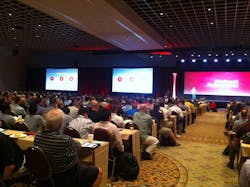Manufacturing execution systems (MESs) are having their moment. The great work of integrating multiple, often paper-based production systems is being tackled by more and more industrial plants, helping plant-floor automation systems deliver the business intelligence that modern manufacturers need.
Rockwell Automation calls this “the Connected Enterprise,” and that phrase is once again the theme for the company’s annual RSTechED conference. RSTechED includes more than 130 technical sessions covering everything from automation and design engineering to enterprise-level manufacturing intelligence systems to industrial network infrastructure and security.
Rockwell Automation’s Architecture and Software business unit, which puts on RSTechED, grew more than twice as fast as its Control Products and Solutions unit (7 percent vs. 3 percent) in the second quarter of 2014. That’s one small indicator that software and business systems are top of mind for manufacturers investing for the future. Another is fact that Rockwell Automation itself is talking about how it is transforming its own assembly operations with MES. Like its customers, Rockwell is connecting plant-floor-gathered data with enterprise resource planning (ERP) systems and business analytics to increase productivity and better manage global operations.
“Fourteen percent of manufacturers in the U.S. have tied their machines to the enterprise network,” said Frank Kulaszewicz, senior vice president of architecture and software in his keynote address. He also mentioned the smarter hardware that is allowing that—controllers based on the Logix control platform: “We're expanding [Logix], making it more scalable and better connected. Logix is getting smarter,” Kulaszewicz said.
But the more interesting portion of the executive keynote session was the description by Bob Murphy, Rockwell Automation vice president of operations, of the company’s own journey of transformation over the past few years: “We had to develop a new respect for global standardization,” he said.
As a plant manager, that’s a challenge, Murphy said. “When you’re the one with that custom application that is not supported globally and something goes wrong, that can be a pretty lonely day—or week or month, depending on your situation.” We produce 387,000 SKUs (stock keeping units), as well as manage configure-to-order and engineer-to-order environments. We outgrew our ability to hold that complexity,” he said.
“We had the machine-level [management systems] down. We were on our way to having a shiny new ERP-level system in place, in the form of SAP. Where we were lacking was in that MES layer,” Murphy said. “There’s where FactoryTalk ProductionCentre became the core. It became the layer that enabled everything else.”
Murphy described a scenario familiar to plant managers in many industries: a complex combination of suppliers, raw materials, processes and geographic locations, all needing to be optimized. “We were managing four centers of board assembly manufacturing around the globe,” he explained. Using the Monterey, Mexico plant as an example, he said that plant ran six robotic lines and “on a single day, they will place 1.5 to 2 million parts on those boards. In a single day, they use 6,500 pieces of raw material to create 10,000 to 15,000 different boards. We will group many work orders and end up with 65 to 70 different changeovers to those lines—in a single day.”
Murphy said the plant logged 55,000 different “transactions” in one day, and had a lot of manual intervention too. “We can’t do that productively and accurately without this MES layer,” he asserts.
Showing a picture of the Powerflex AC drive assembly line in Monterey, Murphy said, “MES is about totally new revision- and specification-control and error proofing. We have documented work instructions tied to SAP that link down to the Atlas Copco torque system shown. If there’s anything that goes wrong in the torque process, the Atlas machine will send a signal that will lock down the SAP system, so [the product] it can’t be moved on to the test system.”
Murphy cited numerous benefits of the new MES system including inventory levels down from 120 days to 82 days. Murphy also cited 30 percent reduction in capital expenditures, in terms of capital avoidance enabled by better capacity utilization.
Where does Rockwell go from here: continued improvement, said Murphy. “As we have improved execution within the plant, we know we can do more. Customers want further improvement to visibility. They want to know how the assembly of their PolwerFlex drive is progressing, for example.”
In addition to Murphy’s keynote remarks, numerous other real-world MES application case history presentations were made at RSTechEd. A fine example is a presentation featuring American Colloid Company by Wendy Armel, a principal MES analyst with system integrator Stone Technologies.
Armel said that understanding hard data on availability and uptime is a prerequisite to tackling production issues or opportunities. When Amcol International, a company that transforms Bentonite clay into 200+ SKUs, needed to better measure bulk powder continuous processes, it turned to FactoryTalk Metrics. The new system combines accurate time-based data from control systems with manually entered data from various locations, then sends automatic alerts for immediate tactical improvements and trend reports for strategic insight. Integration with SAP’s business objects adds analytics for easier decision making, said Armel. A copy of Armel’s presentation is available online via Slideshare.
RSTechED 2014 convened Jun. 15-20 in Orlando, Fla. Next year’s event will be held May 31- Jun. 5 in San Diego.
About the Author
Renee Bassett
Managing Editor

Leaders relevant to this article:
